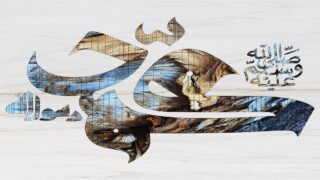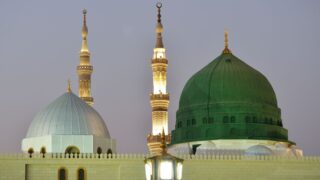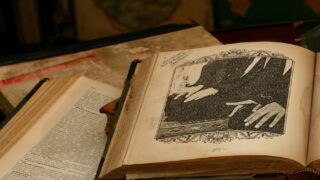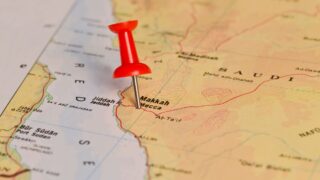Among the first revelations of the Holy Qur’an in Madinah were the prefaces to Surat Al-Baqarah, which talked about the characteristics of the people of faith, the people of unbelief, and the people of hypocrisy, then a reference to the People of the Book – Jews and Christians – and the focus was on the explanation of the truth of the Jews; Because they . are the ones who counteracted the Islamic call from the first day it entered Medina, and Surat Al-Baqarah includes a long part of it to explain the characteristics of the Jews, and their nature.
It is noted: that Surat Al-Baqarah – which is one of the first revealed in the Madinah era – was an invitation to all people to enter the religion of God, and to turn to him in worship. The Almighty said: (O mankind, worship your Lord, who created you and those before you, that you may become righteous * [He] who made for you the earth a bed [spread out] and the sky a ceiling and sent down from the sky, rain and brought forth thereby fruits as provision for you. So do not attribute to Allah equals while you know [that there is nothing similar to Him). [Al-Baqarah: 21 – 22.]
The Qur’anic verses in the Madinah era warn Muslims against having the characteristics of hypocrites, and explain the danger of the hypocrites to the emerging society and the new state. The hypocrisy movement against society and the Muslim state did not appear except in the Madinah era. Because the Muslims in Mecca “were not of power and influence in a situation that calls for the presence of a group of people that terrorizes them, or hopes for their good, so it flatters them, flirts with them on the surface and plots against them in secret, as was the case of the hypocrites in general. The verses include descriptions, information, and attitudes of the hypocrites. And the campaigns against them are so many, that almost no Madinah surah is devoid of it, especially the long and medium ones, and this means: this movement remained almost throughout the Madinah era, although it began to weaken after its first half.
The Madinah Qur’an continued to talk about the greatness of God, the reality of the universe, the desire for Paradise, and the intimidation of the fire, and legislates the provisions for the education of the ummah, and the support of the components of the state, which will carry the spread of God’s call among all people, and strive for the sake of God
The ummah’s scientific march was developing with the development of the stages of da’wah, building society and establishing the state. The Holy Qur’an praised knowledge and those who learn, and hadiths were narrated about the Messenger’s appreciation of knowledge, and hadith books included chapters on knowledge.
The ummah is convinced that knowledge is one of the most important elements of empowerment. Because it is impossible for God Almighty to empower an ignorant ummah that is left behind in knowledge. The beholder of the Holy Quran; would see it clearly: that it is replete with verses that elevate the status of knowledge, and urge its seeking and acquisition, for the Holy Qur’an has made science a counterpart to infidelity; Which is ignorance, and delusion. The Almighty said: ( Is one who is devoutly obedient during periods of the night, prostrating and standing [in prayer], fearing the Hereafter and hoping for the mercy of his Lord, [like one who does not]? Say, “Are those who know equal to those who do not know?” Only they will remember [who are] people of understanding.) [Az-zumar: 9].
The only thing that God Almighty commanded His Messenger, may God bless him and grant him peace, to ask him to increase is knowledge. The Almighty said: (And say, “My Lord, increase me in knowledge” [Taha: 114] And the first characteristic by which God Almighty distinguished Adam, peace be upon him, was knowledge. The Almighty said: “And He taught Adam all the names, then presented them to the angels, and said, “Inform me of the names of these if you are truthful.” [Al-Baqarah: 31]
The Prophet, may God’s blessings and peace be upon him, continued his educational approach, teaching his companions, reminding them of God – the Mighty and Sublime – urging them to noble morals, and explaining to them the subtleties of Sharia and its provisions. His guidance, may God’s blessings and peace be upon him, to his companions sometimes individually, and sometimes collectively, and the beloved Prophet, may God bless him and grant him peace, left us with an enormous wealth in his educational means in teaching and delivering lessons, for he, may God’s blessings and peace be upon him, took care of educational means; Which aids in memorization and good reception, and leads to the stability of hadith in the hearts and minds of the noble Companions, may God be pleased with them; Among these great and useful principles and methods in the Meccan and Medinan eras are:
The most important of these educational methods and principles are:
1 – Repeating and Reinstation of the hadith:
It is easier to memorize, and helps to understand it, and invites to comprehend it, and to be aware of its meanings. That is why the Prophet, may God’s blessings and peace be upon him, was keen to repeat the hadith most of the time. On the authority of Anas bin Malik, may God be pleased with him, on the authority of the Prophet, may God’s blessings and peace be upon him: If he spoke a word he would repeat it three times; until it is understood from him, and if he comes to a people and he greets them; He would greet them three times [Al-Bukhari (95)].
2- Careful in speaking and separating words:
He, may God’s blessings and peace be upon him, was slow and not hasty in his speech, rather he separated between one word and another, so that it would be easier to memorize, and distortion and change would not occur during transmission, to the extent that if the Listener wishes to count his words, it would have been possible. Urwa bin Al-Zubayr – may God have mercy on him! narrated – That Aisha, may God be pleased with her , said: “Don’t you feel surprised at Abu Huraira? He came (one day) and sat beside the nook of my apartment and began to narrate (the hadith of Allah’s Apostle). I was hearing while I was engaged in extolling Allah (reciting Subhan Allah) constantly. He stood up before I finished my repetition of Subhan Allah. if I were to meet him I would have warned him in stern words that Allah’s Messenger (May the blessings and peace of Allah be upon him) did not speak so quickly as you talk..” [Bukhari (3568)].
3- Moderation, not getting bored, and choosing the right time:
He, may God bless him and grant him peace, was economical in his education; in the amount of what he throws, its kind time; So that the Companions do not get bored, and so that they are energized to memorize it, and make it easy for them to understand and comprehend it. On the authority of Ibn Masoud, may God be pleased with him, he said: The Prophet (May the blessings and peace of Allah be upon him) used to take care of us in preaching by selecting a suitable time, so that we might not get bored. (He abstained from pestering us with sermons and knowledge all the time). [Bukhari (68)].
4- Giving examples:
The proverb has a profound effect in conveying the meaning to the mind and heart; That is: it presents the intangible in a sensory form, connects it with reality, and brings it closer to the mind. In addition, the proverb in its various forms has an eloquence that captures the gatherings of hearts, and appeals to minds, especially the minds of rhetoricians. Therefore the Qur’an is begrudged with parables, and mention of the wisdom of this in many verses, God said: (And these examples We present to the people, but none will understand them except those of knowledge.) [Al-‘ankabuut: 43], and the Almighty said: (If We had sent down this Qur’an upon a mountain, you would have seen it humbled and coming apart from fear of Allah. And these examples We present to the people that perhaps they will give thought.) (Al-Hashr: 21). And many other verses, and on this noble approach, the Prophet, may God’s blessings and peace be upon him, proceeded, so he made use of many proverbs, for Abdullah bin Omar, may God be pleased with them both, said: “I memorized a thousand proverbs from the Messenger of God, may God bless him and grant him peace.”
Multiple books have been written on proverbs in the hadith of the Prophet; Among the oldest of them is the book: (Amthaalu Al-Hadith), by Al-qadi Abu Muhammad Al-Hassan bin Abdul Rahman bin Khallad Al-Ramhurzi, (d. 360 AH).
5- Asking questions:
Asking the question is one of the important educational means in linking strong communication between the questioner and the questioned, opening the questioned’s mind, focusing his attention on the answer, and creating a state of complete mental activity; Therefore, the Prophet, may God’s blessings and peace be upon him, used the question in various forms to teach the Companions; Which had a great impact on their good understanding and the completeness of their memorization. Sometimes the Prophet, may God bless him and grant him peace, asks a question just because of excitement, suspense, and drawing attention, and the question then is in the form of drawing the attention (wouldn’t it) often, for Abu Huraira, may God be pleased with him, on the authority of the Prophet, may God bless him and grant him peace And he said: “Shall I not tell you that by which God erases sins and raises ranks?” They said: Yes, O Messenger of God! He said: “Performing ablution in difficult times, taking many steps to mosques, and waiting for prayer after prayer, that is the bond.” [Muslim (251) and Malik in Al-Muwatta (1/161), Al-Tirmidhi (51) and Al-Nasa’i (1/89) and Ibn Majah (428)] .
And sometimes the Prophet, may God’s blessings and peace be upon him, asks them about what he knows: that they have no knowledge of it, and that they will entrust his knowledge to God and His Messenger; Rather, he intended to draw their attention to the subject. On the authority of Abu Hurairah, may God be pleased with him: The Messenger of God, may God bless him and grant him peace, said: “Do you know who is the bankrupt?” They said: “The bankrupt among us is one who has neither money with him nor any property”. He said, “The real bankrupt of my Ummah would be he who would come on the Day of Resurrection with Salat, Saum and Sadaqah (charity), (but he will find himself bankrupt on that day as he will have exhausted the good deeds) because he reviled others, brought calumny against others, unlawfully devoured the wealth of others, shed the blood of others and beat others; so his good deeds would be credited to the account of those (who suffered at his hand). If his good deeds fall short to clear the account, their sins would be entered in his account and he would be thrown in the (Hell) Fire”.” [Muslim (2581) and Al-Tirmidhi (2418)].
And sometimes he asks, and one of the companions responds well, and he would praise him to encourage him and motivate others, as he did with Ubayy bin Kaab, may God be pleased with him; He said: The Messenger of God, may God bless him and grant him peace, said: “Abul Mundhir (this is Ubayy’s Kunya), do you know which verse of God’s Book that you have is greatest?” I replied, “God and His messenger know best.” He repeated his question and I said, “God, there is no god but He, the Living, the Eternal.” Thereupon he struck me on the breast and said, “May knowledge be pleasant for you, Abul Mundhir!”” [Muslim (810), Abu Dawood (1460), and Ahmad (5/142). This approval and encouragement inspires the learner to feel comfortable and self-confident, and invites him to seek, memorize, and acquire more knowledge.
6- Throwing strange and interesting meanings that invite inquiry and question:
One of the nicest and most beautiful of that is what Jabir b. Abdullah reported that Allah’s Apostle (may God bless him and grant him peace) happened to walk through the bazar coming from the side of ‘Aliya and the people were on both his sides. There he found a dead lamb with very short ears. He took hold of his ear and said:
Who amongst you would like to have this for a dirham? They said: We do not like to have it even for less than that as it is of no use to us. He said: Do you wish to have it (free of any cost)? They said: By Allah, even if it were alive (we would not have liked to possess that), for there is defect in it as its ear is very short; now it is dead also. Thereupon Allah’s Messenger (may God bless him and grant him peace) said: By Allah, this world is more insignificant in the eye of Allah than it (this dead lamb) is in your eye.
.” [Muslim (2957)]
7- Use of illustrations:
The Prophet, may God’s blessings and peace be upon him, used what is called today as illustrative means; To decide and confirm the meaning in the hearts and minds of the listeners, and to occupy all their senses with the subject, and to focus their attention on it, which helps to fully understand it, and to memorize it well with all its circumstances; Among these means:
A – The expression by the movement of the hand : such as interlacing, may God’s blessings and peace be upon him, between his fingers, which shows the nature of the relationship between a believer and his brother. On the authority of Abu Musa al-Ash’ari, may God be pleased with him, on the authority of the Prophet, may God bless him and grant him peace, he said: “A believer to a believer is like a building; holding each other together.” And he intertwined his fingers [Bukhari (2446) and Muslim (2585)].
B – Expressing by drawing : He, peace and blessings of God be upon him, used to draw illustrative lines on the ground that drew the attention of the Companions, then he took to explain the vocabulary of that drawing, and clarify the purpose of it. It was narrated from ‘Abdullah bin Mas’ud that God’s messenger drew a line for them and then said, “This is God’s path.” Thereafter he drew several lines on his right and left and said, “These are paths on each of which there is a devil who invites people to follow it.” And he recited, “And that this is my path, straight; follow it…”.” [Al-An’am: 244] and Al-An’am (235) and Al-An’am (235)
C – Expressing by raising and showing the subject matter of the conversation , as he, peace and blessings of God be upon him, did when talking about the ruling on wearing silk and gold. Ali bin Abi Talib, may God be pleased with him, said: The Prophet of God, may God bless him and grant him peace, took silk, put it in his right hand, and took gold and put it in his left hand, then said: “These two are forbidden for the males of my ummah” [Abu Dawud (4057) and An-Nasa’i (8/160)], and he added in a narration: “It is permissible for their females” [the two previous sources], so the Prophet, may God’s blessings and peace be upon him, combined Between saying, and raising gold and silk, and showing them, so that they can be heard and seen, so that is clearer and more helpful in memorizing.
D – Practical education by doing something in front of people , as he did when he, may God’s prayers and peace be upon him, ascended the pulpit, and prayed so that all people could see it. On the authority of Sahl bin Saad al-Saadi, may God be pleased with him, he said: I saw the Messenger of God, may God’s blessings and peace be upon him, standing on the pulpit, facing the qiblah, and said ‘God is most great’, the people standing behind him. He recited some verses and bowed, and the people bowed behind him. He then raised his head, moved backwards and prostrated himself to the ground, then returned to the pulpit, then recited some verses, then bowed, then raised his head, then moved backwards and prostrated himself to the ground.” This is Bukhari’s wording. In a version given both by him and by Muslim there is something similar, at the end of which it is said:
Then when he finished he faced the people and said, “O people, I have done this only that you should be guided by me and know how I conduct prayer.” [Al-Bukhari (377)]
8 – Use of kind and gentle phrases:
The use of gentle speech and gentle expressions harmonizes hearts, entices them to the truth, and pushes the listeners to awareness and memorization. He, peace and blessings of God be upon him, would pave his words and direct them with a gentle phrase, especially if he was about to teach them what they might be ashamed of mentioning, as he did when teaching them etiquette easing oneself. For this he presented that he is like a father to the believers, teaching them; Pitying them, for he, peace and blessings of God be upon him, said: “I am to you in the position of a parent, I teach you. When any of you goes to privy, he should not face or turn his back towards the qiblah. He should not cleanse with his right hand.” [Abu Dawud (8)]
This article follows the series ” Education in the Madinah era “
Educational methods and principles used in the madinah era (1)
Educational methods and principles used in the Madinah era (2)
















